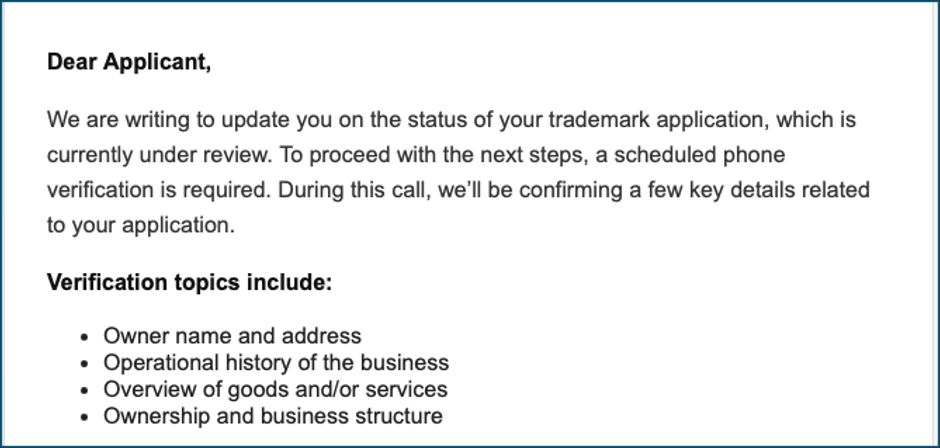- in European Union
- in European Union
- with readers working within the Technology and Securities & Investment industries
- within Privacy, Law Department Performance, Food, Drugs, Healthcare and Life Sciences topic(s)
- with Inhouse Counsel
It Just Keeps Getting Scarier: How Trademark Scams Can Haunt Your Business
We've reported before on a litany of scams currently circulating that involve outstanding trademark applications to the United States Patent and Trademark Office. Unfortunately, as awareness of one set of scams increases, newer, more savvy scams take their place. In honor of the spookiest time of the year, here's the latest trademark scam we've encountered and tips on how to protect your brand—and yourself.
A Frightening New Wave of Trademark Scams
We've recently seen a new scam that involves a letter purportedly from the USPTO, advising that a pending trademark application will be halted or impeded unless the owner participates in a phone call with an alleged USPTO employee to verify and confirm ownership of the mark. The communication further outlines that the call will be to discuss and verify (1) owner name and address; (2) operational history of the business; (3) ownership of goods/services; (4) ownership and business structure.

How to Spot a Fake USPTO Communication
To many, this new scam may appear to be legitimate, particularly since it references the actual serial number for the pending application and names someone who appears to be employed by the USPTO. However, a number of "tells" exist that mark this communication as a scam, including:
- The communication is not on official USPTO letterhead.
- The email address has been named "USPTO.gov" but actually originates (as shown in the full address) from teas@uspto-reminder.com which leads to an inactive website.
- The communication does not appear in the prosecution history for the cited application. With rare exception, communications from the USPTO to the owner of a mark will appear in the prosecution history for that mark as an outgoing communication from the trademark office.
- Relative to a trademark application, the USPTO does not consider the operational history of a business or a business's ownership structure. Rather, the information the USPTO needs to evaluate a trademark application is included in the application as filed. Should an Examiner require additional information, you (or your counsel) will receive an email from the Examiner with an email address that ends with "uspto.gov."
How to Protect Your Brand from Trademark Scams
One of the spookiest byproducts of the many scams currently active is that trademark owners have difficulty differentiating between harmful scams posing false deadlines and legitimate communications from the USPTO with actual deadlines that can impact the viability of a pending application. Fortunately, the same tools we have referenced before can be used to identify and avoid being taken in by this scam, including:
- Paying close attention to the actual email address from which the communication originates (you can hover over the email address to see the full address if it is not readily visible). USPTO website addresses end in .gov, and emails directly from the USPTO end in @uspto.gov.
- Checking the prosecution history for the particular mark that is cited. As noted in the USPTO's own website, "If the letter or email you received does not appear in your TSDR file, then with few exceptions, it is not from the USPTO." See https://www.uspto.gov/subscription-center/2020/beware-email-scams .
- If your file has received an office action, contact the Examiner attorney listed on the official office action to confirm whether a communication you have received is legitimate.
- If your file has not yet been assigned to an Examiner, you can call the Trademark Assistance Center (TAC) at 1-800-786-9199 to confirm if the communication is genuine.
Don't Let Scammers Haunt Your Brand
Additional measures can also be taken, including having an IP-based firm listed as the contact email on any given application. Based on our recent experience, it appears that scammers are reviewing publicly available information in the USPTO database regarding pending applications and targeting those that appear to have been filed by individuals or non-lawyers; in other words, seeing a non-lawyer email address on the file is viewed as potential "low hanging fruit" leading them to consumers who may be less informed of USPTO practices and more likely to succumb to the scam. Finally, if you remain uncertain, contact reliable IP counsel to review the communication and offer guidance on whether it is, or is not, legitimate.
The content of this article is intended to provide a general guide to the subject matter. Specialist advice should be sought about your specific circumstances.

